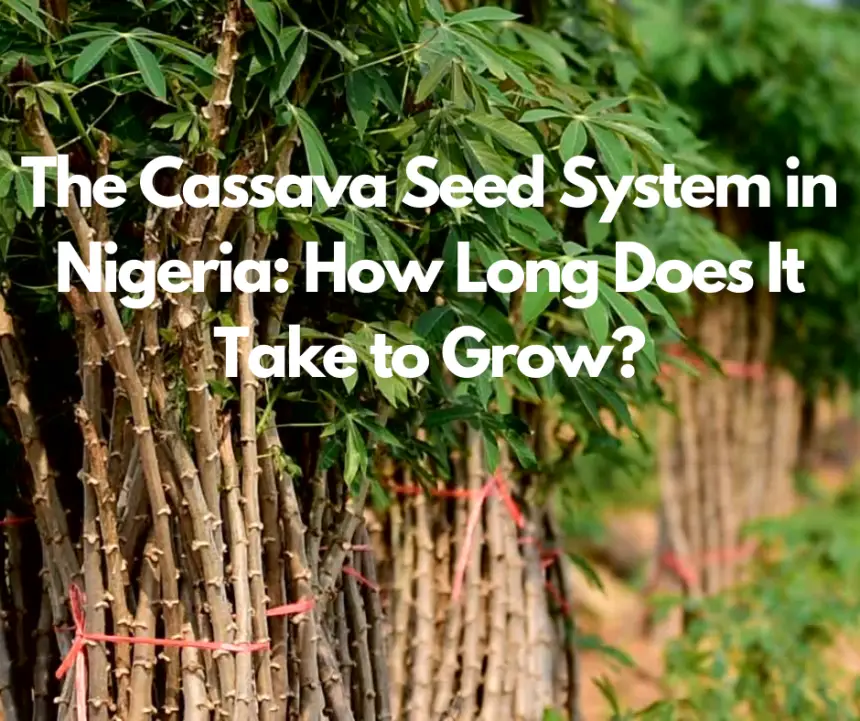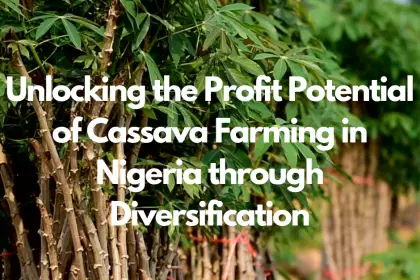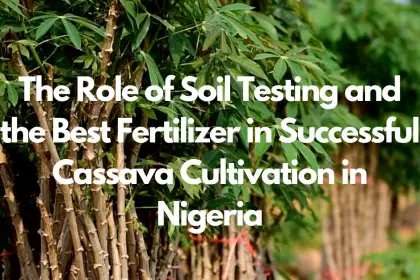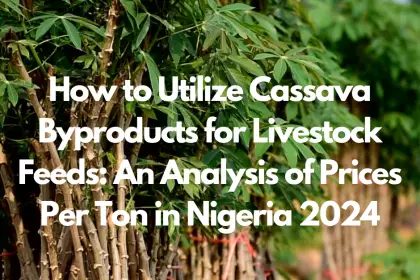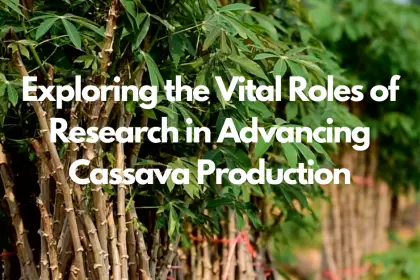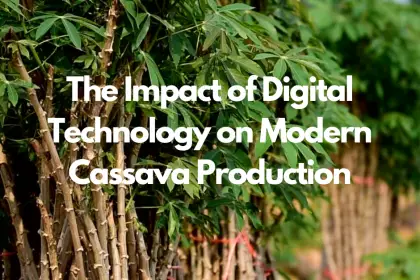Nigeria stands as the world’s largest producer of cassava, cultivating 59 million tonnes annually and making this crop a cornerstone of food security. The question of how long does it take cassava to grow in Nigeria is pivotal, especially given that the nation’s cassava seed system operates largely informally. Such information is crucial not only for improving yields but also for enhancing the staple food supply, impacting food security positively.
Understanding the dynamics of cassava growth and the intricacies of the seed system in Nigeria provides insights into efforts to streamline cultivation processes. This article aims to explore the cassava seed system, focusing on quality control measures and digital innovations that promise to elevate cassava production. In doing so, it addresses the critical aspect of how long it takes for cassava to grow, enlightening both local farmers and stakeholders on optimizing production for better food security.
Understanding Cassava Seed Systems
The cassava seed system in Nigeria, as detailed in the 2020 working paper from the RTB Working Paper series, provides a comprehensive overview of the current state and challenges faced by cassava production in the country. This analysis draws on a wealth of sources including prior research, public policy documents, government statistics, and insights from the 2015 Cassava Monitoring Survey of Nigeria (CMS), offering a multifaceted view of the seed system.
Key aspects of the cassava seed system in Nigeria include:
- Production and Supply: The paper scrutinizes the production and supply chain of cassava planting material, highlighting the role of quality assurance systems and their implications for smallholder farmers.
- Market Dynamics: It delves into the market, non-market, and regulatory frameworks that influence the cassava seed market, focusing on their effectiveness and reach.
- Policy and Regulatory Recommendations: Suggestions for policy and regulatory reforms are made, advocating for a decentralized approach to enhance the cassava seed system. This includes investment in community and enterprise-level innovation capacities.
Furthermore, the establishment of sustainable cassava seed systems is underscored by initiatives such as the deployment of new technologies for early generation seed (EGS) production, the introduction of high-yielding and disease-resistant varieties, and the creation of networks of cassava seed entrepreneurs (CSEs). These efforts are aimed at bolstering the productivity and quality of cassava crops, crucial for ensuring food security in Nigeria.
Quality Control Measures in Cassava Seed Systems
Quality control measures are pivotal in enhancing the efficiency, output, and overall quality of cassava products. These measures directly influence the financial returns from cassava processing, underscoring the necessity for rigorous control analyses. The primary materials subjected to analysis in cassava processing include:
- Cassava Roots: The cornerstone of cassava processing, where starch content determination is crucial for process control.
- Water: Essential in the processing, especially in determining the suitability of materials through small-scale reproduction tests.
Furthermore, the presence of hydrocyanic acid in cassava products necessitates stringent testing due to the potential health risks associated with its consumption. Despite the recognized importance of quality control measures, research indicates that their adoption in cassava flour-based enterprises in Abia State, Nigeria, remains below expectations. Factors influencing this adoption include:
- Level of Education and Availability of Qualified Personnel: Higher education levels and access to skilled workers positively impact the adoption of quality control measures.
- Profit Level and Cost of Operation: Financial considerations play a significant role, with enterprises weighing the benefits against the costs of implementing quality control systems.
- Government Policies: Regulatory frameworks and policies can either facilitate or hinder the adoption of quality control measures.
The impact of quality control on cassava production is profound, with statistically significant differences in mean income observed between enterprises that utilize quality control practices and those that do not. This highlights the economic benefits of committing to total quality control, supported by both action and legislation.
Impact of Quality Control on Cassava Production
The influence of quality control and management practices on cassava production cannot be overstated, with significant variations observed based on soil quality, cropping systems, and the adoption of improved seed varieties. Here’s a closer look at how these factors impact cassava yield and the overall productivity of Small and Medium Scale Enterprises (SMEs) in Nigeria:
- Soil and Cropping Systems:
-
- Maximum yield is achieved on fertile, sandy clay loam soil when cassava is intercropped with maize and cowpea in relay cropping systems.
- Conversely, the lowest yield is recorded on degraded, low fertility, compacted sandy soil under a maize/cassava/crop mixture with cashew.
- Impact on SME Performance:
-
- Quality control measures have a positive influence on the performance of SMEs in Southwestern Nigeria, underscoring the importance of adopting such practices for enhanced productivity and financial returns.
- Benefits of Improved Seed System Models:
-
- Adoption of improved cassava varieties has led to a 30-50% increase in yield for farmers.
- This increase not only boosts farmer income but also contributes significantly to food security in Nigeria.
These findings underscore the critical role of good management practices, soil quality, and the adoption of improved seed varieties in enhancing cassava production, ultimately contributing to the staple food supply and food security in Nigeria.
Digital Innovations in Cassava Seed Quality Assurance
In the realm of cassava seed quality assurance, digital tools and innovations have emerged as game-changers in Nigeria and beyond. These technologies not only streamline the process of seed certification but also ensure the traceability and quality of cassava seeds, vital for sustaining the staple food supply and enhancing food security.
- Digital Tools for Enhanced Traceability and Quality Assurance:
-
- The Cassava Seed Tracker and Seed Tracker platforms are pivotal in Nigeria and Rwanda, offering a comprehensive system to monitor seed multiplication, distribution, and ensuring seeds meet quality standards.
- The National Agricultural Seeds Council (NASC) has introduced the Cassava Seed Tracker (CST), a pioneering e-certification system that integrates seamlessly with national agricultural research systems, reinforcing the backbone of sustainable cassava production.
- Innovative Breeding and Propagation Techniques:
-
- Utilizing genomic resources and high-throughput genotyping platforms, breeders can now employ SNP markers for rapid and accurate fingerprinting, enhancing the precision of cassava breeding through approaches like genomic selection and QTL utilization.
- Tissue culture and semi-autotrophic hydroponics (SAH) technology have been adapted for cassava propagation, establishing a robust foundation for high-quality seed production across several African countries.
- Remote Sensing and Mobile Applications:
-
- The integration of remote sensing and satellite imagery with mobile applications like the PlantVillage Nuru App revolutionizes the way cassava seed quality is assessed, offering real-time insights and actionable data to farmers and stakeholders.
These digital innovations not only promise to elevate the quality and efficiency of cassava seed systems but also play a crucial role in ensuring the sustainability and resilience of cassava production in Nigeria, contributing significantly to the nation’s food security agenda.
Case Studies: Successful Models of Cassava Seed Systems
In Nigeria, the world’s largest producer of cassava, successful models of cassava seed systems have been instrumental in addressing the challenges of the cassava subsector. These models have been pivotal in ensuring the growth and sustainability of cassava production, which is crucial for food security and economic stability.
- BASICS Project Initiatives:
-
- Village Seed Entrepreneur (VSE) Model and Processor Led Model (PLM): These business models facilitated the distribution and multiplication of seeds, leveraging Rapid seed multiplication technology, including Semi-Autotrophic Hydroponics (SAH).
- Commercial Sale of Cassava Planting Material: Focused on the commercial sale of high-quality, NASC-certified cassava planting material, the BASICS project significantly raised cassava productivity by overhauling the seed sector into a responsive, sustainable, and integrated value chain.
- Public-Private Partnership Models:
-
- IITA Improved Seed System Model: Utilized registered seed entrepreneurs for the production and distribution of improved cassava varieties.
- Seed Certification Agencies (SCAs): Established through a partnership between the Agricultural Seeds Council (ASC) and the Cassava Seed Systems Project (CSSP) to certify cassava seeds, ensuring quality and reliability.
These models underscore the importance of business-oriented production systems, new technologies for early generation seed production, promotion of high-yielding and disease-resistant varieties, and updated government seed policy for enabling certification guidelines. Through these initiatives, cassava seed systems in Nigeria have become more efficient, contributing significantly to the staple food supply and food security.
Conclusion
The exploration of Nigeria’s cassava seed system reveals the significant strides made towards enhancing cassava production through quality control measures, digital innovations, and successful business models. These initiatives are crucial for addressing the challenges within the cassava subsector, ultimately leading to increased productivity and food security in Nigeria. The emphasis on improving seed quality, adopting advanced technologies for seed tracking and quality assurance, and fostering business-oriented production systems has set a sustainable path forward for the cassava industry.
As Nigeria continues to leverage these innovations and models, the future of cassava production appears promising, with potential profound impacts on the nation’s food security and economic stability. These efforts underscore the importance of continued investments in research, technology adoption, and policy support to ensure the cassava seed sector remains robust and responsive to the challenges ahead. Thus, stakeholders and policymakers are encouraged to sustain and expand these initiatives, reinforcing Nigeria’s position as a global leader in cassava production.
FAQs
How much time is required for cassava to grow in Nigeria?
Cassava cultivation in Nigeria results in the roots being ready for harvest anywhere from 6 months to 3 years after planting. The typical farm size in Nigeria ranges from 0.5 to 2.5 hectares (1.2 to 6.2 acres), with small-scale farms making up approximately 90% of producers.
What is the maturation period for cassava?
Cassava typically reaches full growth within 9 to 24 months, and occasionally up to 36 months, depending on factors such as the specific variety, the local climate, and soil conditions. While there are faster-growing varieties that can be harvested as early as 6 to 7 months, optimal yields are usually achieved after 9 to 12 months.
When is the ideal time to plant cassava?
The best time to plant cassava stems is from April through September or October. It is recommended to plant them on ridges that are about 40cm wide and 40-60 cm tall in a single row, which facilitates easier care for the plants.
What is the average cassava yield per plot in Nigeria?
In Nigeria, farmers can potentially harvest up to 40 tonnes of cassava per hectare (16.2 tons per acre) using the TME 419 variety of cassava. However, typical yields are generally between 10 to 15 tonnes per hectare (4 to 6 tons per acre), which is relatively low when compared to countries like Thailand.
How Government Initiatives are Transforming Cassava Farming in Nigeria

Cassava farming in Nigeria holds a pivotal position in the nation’s agriculture, contributing significantly to the rural economy especially in the southern regions and reaching new heights in cultivation across the country. As the world’s largest producer of cassava, Nigeria’s production exceeds 34 million tonnes annually, driven by an expanding population, internal market demand, and advancements in agricultural technology. This growth in cassava farming practice is further supported by the development of high-yielding cassava varieties and an effective market structure, predominantly managed by small-scale farmers with rudimentary tools.
The history of cassava farming in Nigeria is marked by government initiatives aiming to transform these farm practices into a more productive and sustainable sector. These efforts encompass the introduction of improved farming practices, infrastructure upgrades, and technological supports that collectively aim to amplify cassava yield and quality. With women contributing significantly to the cassava value chain, these initiatives not only seek to advance agricultural technology but also empower a major portion of the agricultural labor force. This article delineates the role of government policies, case studies showcasing their impacts, and addresses the challenges lying ahead in enhancing cassava farming in Nigeria.
Historical Overview of Government Support for Cassava Farming
The transformation of cassava farming in Nigeria has been significantly influenced by government initiatives aimed at improving agricultural productivity and ensuring national food security. Starting from the early 1970s, a series of programs and policies have been introduced to support cassava production, processing, and marketing:
- Presidential Cassava Initiative (PCI): Implemented from 2001 to 2007, the PCI led to a 19.10% increase in cassava output and enhanced national food security by 1.90%.
- Cassava Multiplication Programme (CMP): An IFAD-assisted program that facilitated large-scale planting material multiplication and distribution, significantly expanding cassava land area and production
Key Government Policies and Their Impacts
In the landscape of
Infrastructure and Technological Support for Cassava Farmers
In the realm of cassava farming in Nigeria, significant strides have been made through the integration of infrastructure and technological support. Here are the key areas of advancement:
- Machinery and Technology Adoption:
-
- Smallholder cassava harvesting and peeling machines have been identified and adapted to suit local needs, enhancing efficiency and reducing labor.
- Development of cassava varieties and machines tailored for smallholder use encourages broader adoption of modern farming practices.
- Investments in contemporary processing technologies, like automated drying equipment and mechanized peeling machines, aim to boost productivity and product quality while mitigating post-harvest losses.
- Financial and Logistical Support:
-
- The encouragement of private sector investments in cassava technologies has been pivotal for expanding use within Nigeria and across Africa.
- Provision of soft loans and the improvement of accessible roads are recommended strategies to lower transportation costs, thereby improving cassava production profitability.
- Research, Development, and Training:
-
- Genomic resources and tools, including SSR markers and the cassava chromosome-scale reference genome, have been developed to support breeding programs.
- High-throughput genotyping platforms facilitate the fingerprinting of cassava accessions, aiding in the assessment of genetic diversity and the selection of parental lines.
- Training programs focusing on the use of non-invasive approaches for disease detection and cassava quality assessment ensure that farmers are equipped with the knowledge to implement these technologies effectively.
These advancements underscore the government’s commitment to transforming cassava farming into a more productive and sustainable sector, leveraging technology and infrastructure to meet the challenges of modern agriculture.
Case Studies: Success Stories from Government Initiatives
The YieldWise Initiative, a program supported by the Rockefeller Foundation, stands out as a beacon of success in the cassava farming sector in Nigeria. It targets a reduction in post-harvest loss by at least 50% across various food value chains in Africa, including cassava, aiming to uplift smallholder farmers’ incomes by 15%. This initiative collaborates with ten processors in a block farming model, which not only guarantees a steady supply of quality raw materials for processors but also secures a predictable income source for farmers. Additionally, it aids processors in establishing agricultural units composed of crop researchers, extension officers, project coordinators, and monitoring and evaluation officers, all working closely with the farming community.
- Cassava Production Increase: Cassava production in Bénin and Sierra Leone saw significant growth, becoming essential for food security, especially during Sierra Leone’s civil war. The processing of cassava into common products like gari, lafun, and starch, as well as unique products such as cassava bread in Sierra Leone and both gari and starch in Bénin, showcases the versatility and importance of cassava in these regions.
- Challenges in the Sector: Despite government incentives and donor interventions, the cassava sector in Nigeria, particularly focusing on High-Quality Cassava Flour (HQCF) producing Small Medium Size Enterprises (SMEs), has faced struggles in achieving momentum for nearly 15 years. A study highlights that most SMEs fail to meet the defined HQCF quality specifications, lacking any form of quality management systems or control tools, underscoring the need for enhanced support and training in quality assurance practices.
This analysis sheds light on the profound impact of targeted government initiatives and the ongoing challenges within the sector, emphasizing the importance of continuous support and improvement in cassava farming practices.
Challenges and Areas for Improvement
Despite the significant strides in cassava farming, several challenges persist, impacting the sector’s overall efficiency and productivity. Addressing these challenges requires a multifaceted approach, focusing on both immediate and long-term solutions:
- Labor and Technology Constraints:
-
- Insufficient labor for harvesting and processing, particularly of high-yielding TMS varieties.
- Low yield and inadequate adoption of contemporary innovations and technology.
- Solutions include investing in machinery and training programs to increase adoption rates of modern farming practices.
- Pest, Disease, and Environmental Challenges:
-
- Pest and disease control, notably mosaic disease, cassava bacterial blight, and anthracnose disease.
- Weather variability due to climate change.
- Strengthening research on disease-resistant cassava varieties and developing climate-adaptive farming practices.
- Market and Infrastructure Limitations:
-
- Inadequate market access, fluctuating prices, and storage and transportation issues.
- Solutions involve improving rural infrastructure, establishing stable market linkages, and enhancing warehousing facilities.
By targeting these areas for improvement, the government and stakeholders can ensure the sustainable development of the cassava sector, ultimately contributing to food security and economic stability in Nigeria.
Conclusion
The transformative journey of cassava farming in Nigeria, propelled by strategic government initiatives, marks a significant triumph in the realm of agriculture. These efforts have not only fostered advancements in farming practices and technological adoption but also played a crucial role in enhancing the socio-economic status of smallholder farmers and women in the agricultural sector. Highlighting the successes and challenges, the discourse invariably reflects upon the imperative need for continuous support, targeting areas that necessitate further improvement to ensure the sector’s sustainable development and its contribution to national food security.
As we contemplate the future of cassava farming in Nigeria, the potential for growth and the need for ongoing enhancement in quality management systems, infrastructure, and market access remain paramount. The enduring significance of government policies, alongside technological and infrastructural support, underscores their vital role in addressing the challenges presented. Such endeavors will not only pave the way for increased productivity and sustainability within the cassava sector but also contribute significantly to the broader agricultural landscape, promising a better future for Nigeria’s rural economy and its position on the global stage.
FAQs
What is the Presidential Initiative on Cassava in Nigeria?
The Presidential Initiative on Cassava (PIC) in Nigeria, which began in July 2002, is focused on boosting cassava productivity and production. The initiative aims to expand the cassava cultivation area to 5 million hectares and achieve an annual harvest of 150 million tons of fresh cassava tubers. Additionally, it strives to process 37.5 million tons of these tubers.
How can the Nigerian government enhance agricultural production?
The Nigerian government can enhance agricultural production through several means: improving transport facilities to ease the movement of goods; establishing irrigation facilities to support year-round farming; providing farmers with improved tools and equipment to increase efficiency; enhancing soil conditions for optimal crop growth; and offering agricultural education to equip farmers with modern farming techniques and knowledge.
What is the current trend in cassava production in Nigeria?
Cassava production in Nigeria has been on the rise, primarily driven by the increasing domestic demand due to rapid population growth and a large internal market. This increase is also supported by the availability of high yielding, improved cassava varieties and relatively well-developed market access.
Why is cassava production economically important in Nigeria?
Cassava production holds significant economic importance in Nigeria as it serves not only as a staple food crop but also as a major source of cash income for households that grow it. Cassava stands out among other staples for its contribution to cash earnings and its positive impact on poverty alleviation for a large number of households.

